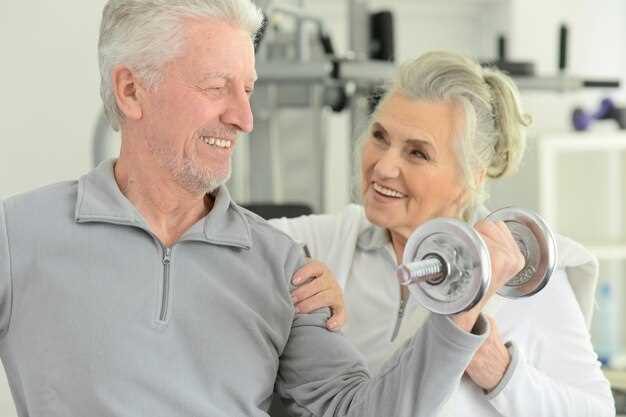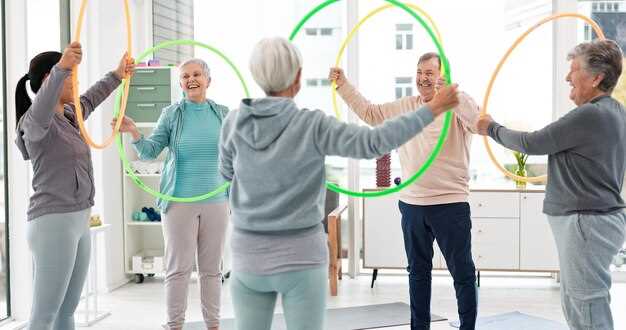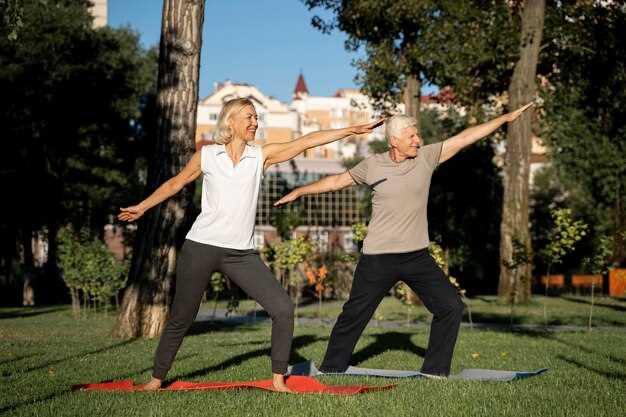Physical Trainer for Seniors – A Comprehensive Guide to Maintaining Optimal Fitness and Wellness During Your Golden Years

As we gracefully embrace the wisdom and experience that come with age, it becomes increasingly important to prioritize our well-being. In an era when the world continuously evolves, it is crucial to recognize the significance of maintaining a strong physique and a healthy mind. With the passing of time, our bodies go through natural changes that require adaptable approaches to fitness and overall health. This is especially true for the older segment of our population, who deserve tailored guidance on staying active and vibrant for years to come.
In today’s fast-paced society, where technological advancements often contribute to a sedentary lifestyle, it is essential for older individuals to break free from the confines of their comfort zones and engage in regular physical activities. Engaging in structured exercises not only improves physical strength but also enhances mental agility, boosting our overall well-being. To successfully navigate this journey, guidance from a dedicated professional is invaluable, as they possess the expertise to tailor fitness regimens that cater specifically to the unique needs and capabilities of seniors.
Embracing an active lifestyle offers a multitude of benefits, both physically and mentally, that extend beyond the obvious payoff of maintaining a healthy weight or managing chronic conditions. By engaging in regular exercise routines, seniors can build strength, improve balance and flexibility, and increase cardiovascular endurance. Not only does this help prevent falls and injuries, but it also fosters a sense of independence, confidence, and empowerment.
However, the journey towards a healthier and more active lifestyle requires more than just physical exertion. It demands a holistic approach that addresses mental well-being as well. Engaging in activities that stimulate the mind, such as solving puzzles, reading, or learning new skills, can reduce the risk of age-related cognitive decline and promote mental sharpness. By incorporating both physical and mental exercise into daily routines, seniors can experience a higher quality of life, maintaining vitality and embracing the golden years with grace.
Why is Regular Exercise Essential for Older Adults?
Regular physical activity plays a crucial role in maintaining overall well-being and vitality in older individuals. Engaging in regular exercise can significantly improve various aspects of seniors’ lives, including their physical, mental, and emotional health.
Physical activity helps older adults maintain their mobility, strength, and flexibility. By engaging in regular exercise, seniors can enhance their muscle tone, improve their balance, and increase their overall endurance. This helps prevent age-related muscle loss, reduces the risk of falls, and promotes independence in daily activities.
Beyond its physical benefits, regular exercise also offers significant mental and cognitive advantages. Physical activity stimulates brain function and enhances cognitive abilities such as memory, attention, and problem-solving. It can also reduce the risk of developing age-related cognitive decline and conditions such as dementia and Alzheimer’s disease.
Additionally, engaging in regular exercise promotes emotional well-being and reduces the risk of mental health issues commonly experienced in older adults, such as depression and anxiety. Physical activity stimulates the release of endorphins, known as “feel-good” hormones, that contribute to improved mood and reduced stress levels.
Moreover, regular exercise can help manage chronic conditions and prevent the onset of certain diseases. It helps control blood pressure, reduces the risk of heart diseases, and improves overall cardiovascular health. Additionally, physical activity can aid in managing conditions such as diabetes, arthritis, osteoporosis, and certain types of cancer.
In conclusion, regular exercise is vital for seniors as it provides numerous physical, mental, and emotional benefits. By incorporating physical activity into their daily routines, older adults can enhance their quality of life, maintain their independence, and enjoy their golden years to the fullest.
Maintaining Strength and Flexibility of Muscles and Joints in the Later Stages of Life

As we age, it becomes increasingly important to focus on preserving the strength and flexibility of our muscles and joints. These two elements are crucial for maintaining independence, preventing injuries, and enjoying a fulfilling and active lifestyle in our later years.
Preserving muscle strength not only helps us carry out everyday tasks with ease but also contributes to overall balance, stability, and posture. Similarly, maintaining joint flexibility allows for a better range of motion and minimizes the risk of joint pain and stiffness.
There are various approaches to ensuring the longevity of muscle strength and joint flexibility. Engaging in regular physical activity is paramount. Exercise routines that incorporate both cardiovascular workouts and strength-training exercises help build and maintain muscle mass while enhancing joint flexibility.
Furthermore, it is essential to focus on exercises that target specific muscle groups and joints, emphasizing both endurance and resistance training. This combination helps strengthen muscles while improving joint mobility and stability.
Additionally, incorporating stretching exercises into our daily routine aids in maintaining joint flexibility. These exercises can be as simple as gentle stretches for various muscle groups or more targeted stretches designed to enhance flexibility in specific joints.
It is important to remember that as we age, our bodies may require modifications and accommodations. Listening to our bodies and working within our limitations is crucial to prevent injuries. Seeking guidance from trained professionals, such as physical therapists or experienced trainers, can provide tailored exercise plans and ensure safe and effective workouts.
In conclusion, prioritizing the preservation of muscle strength and joint flexibility in our later years is vital for optimizing our physical health and well-being. Regular exercise and incorporating appropriate stretching routines can contribute to maintaining strength, mobility, and overall quality of life as we enjoy our golden years.
Reducing the Risk of Chronic Diseases
As we age, it becomes increasingly important to focus on preventive measures against chronic diseases. By actively taking steps to reduce the risk of developing these conditions, we can maintain our health and well-being throughout our golden years.
| Key Strategies | Benefits |
|---|---|
| Engage in Regular Physical Activity | Enhances cardiovascular health, strengthens muscles and bones, improves balance and coordination. |
| Follow a Nutritious Diet | Provides essential nutrients, promotes healthy weight management, boosts immune system. |
| Maintain a Healthy Weight | Reduces the risk of heart disease, diabetes, arthritis, and other chronic conditions. |
| Manage Stress Levels | Improves mental health, lowers blood pressure, prevents stress-related diseases. |
| Get Enough Quality Sleep | Supports cognitive function, strengthens immune system, reduces the risk of chronic illnesses. |
| Stay Hydrated | Optimizes bodily functions, aids digestion, maintains healthy skin. |
| Regular Medical Check-ups | Allows for early detection and management of potential health issues, ensures appropriate treatment. |
| Avoid Tobacco and Excessive Alcohol Consumption | Lowers the risk of lung cancer, heart disease, liver damage, and other serious health problems. |
| Stay Socially Active | Reduces the risk of depression, improves cognitive function, provides a sense of belonging. |
By incorporating these strategies into our daily lives, we can significantly decrease the likelihood of developing chronic diseases. It is never too late to start prioritizing our health and taking proactive measures to ensure a vibrant and fulfilling senior lifestyle.
Improving Mental Well-being and Cognitive Function in the Senior Years
Enhancing mental well-being and optimizing cognitive function are vital aspects of maintaining overall health and quality of life as we age. In this section, we will explore various strategies and practices that can help seniors boost their mental well-being and preserve their cognitive abilities, allowing them to lead fulfilling and active lives.
Nurturing the Mind:
Engaging in activities that stimulate the mind and encourage continuous learning is essential for mental well-being and cognitive function. These activities can include reading books, solving puzzles and crosswords, learning a new language, or exploring creative endeavors such as painting or playing a musical instrument. By challenging the mind and expanding intellectual horizons, seniors can keep their cognitive skills sharp and maintain mental acuity.
Embracing Social Connections:
Social interactions and meaningful connections are fundamental to a healthy mind. Engaging in conversations, participating in group activities, and joining community clubs or organizations can foster a sense of belonging, reduce feelings of loneliness or isolation, and provide mental stimulation. Strong social ties contribute to emotional well-being and can even enhance cognitive function through the exchange of ideas and experiences.
Practicing Mindfulness and Meditation:
Incorporating mindfulness and meditation techniques into daily routines can significantly improve mental well-being. These practices involve focusing on the present moment, cultivating self-awareness, and developing a non-judgmental attitude towards thoughts and emotions. Mindfulness and meditation have been shown to reduce stress, improve concentration, and enhance overall cognitive function, making them valuable tools for seniors seeking to optimize their mental health.
Being Physically Active:
Regular physical activity has been found to have numerous benefits for mental well-being and cognitive function. Engaging in exercises that get the heart rate up, such as walking, swimming, or cycling, promotes the release of endorphins and improves blood flow to the brain. This increased blood flow delivers essential nutrients and oxygen to the brain, supporting cognitive function and reducing the risk of cognitive decline.
Adopting a Brain-Healthy Diet:
Following a nutritious, well-balanced diet is essential for maintaining mental well-being and cognitive function. Consumption of foods rich in omega-3 fatty acids, antioxidants, and vitamins, such as fatty fish, nuts, fruits, and vegetables, can provide essential nutrients to support brain health. Additionally, staying adequately hydrated and limiting the intake of processed foods and sugary drinks can contribute to optimal mental functioning.
Prioritizing Quality Sleep:
Sleep plays a vital role in cognitive function and overall well-being. Seniors should ensure they get sufficient and restful sleep each night, aiming for the recommended seven to eight hours. Creating a comfortable sleep environment, practicing relaxation techniques before bed, and establishing a consistent sleep routine can improve sleep quality, enhance memory consolidation, and promote mental clarity during waking hours.
Continuing to Learn and Engage:
One should never stop learning and engaging with the world around them, regardless of age. Pursuing new hobbies, taking up educational courses, attending cultural events, and seeking intellectual stimulation through various means can foster personal growth and boost mental well-being. Embracing the mindset of lifelong learning and curiosity can be one of the most effective ways to maintain mental vitality in the golden years.
Improving mental well-being and cognitive function requires a holistic approach that combines intellectual engagement, social connections, physical activity, and a healthy lifestyle. By implementing these strategies and making them an integral part of daily life, seniors can enjoy the many benefits of a sharp mind and vibrant mental health as they age gracefully.
Choosing the Ideal Fitness Mentor for Older Adults

When it comes to selecting an appropriate guide to help older individuals achieve optimal physical health, the task can be both challenging and crucial. It is essential to find the right assistant who understands the unique requirements and potential limitations of seniors, while also possessing the knowledge and expertise to guide them towards their fitness goals.
One important aspect of selecting a suitable fitness mentor for older adults is to consider their level of experience working with mature individuals. Look for trainers who have a proven track record in catering to the specific needs of seniors, as they will possess the necessary knowledge to develop an effective exercise plan that takes into account age-related changes such as joint issues, decreased flexibility, and overall stamina.
In addition to experience, it is essential to ensure that the chosen fitness mentor has a strong understanding of safety measures and injury prevention techniques. They should be able to design workouts that are gentle yet effective and include modifications to accommodate any physical limitations seniors may have, allowing them to exercise comfortably and without the risk of injury.
Furthermore, effective communication skills are vital when selecting a physical trainer for older adults. Look for someone who can clearly explain exercises, provide feedback and motivation, while being patient and understanding throughout the fitness journey. The ability to adapt instructions to fit individual needs and learning styles is also an important quality to consider.
Another key factor to consider is the availability and flexibility of the fitness mentor. Older adults may require more frequent sessions, shorter sessions, or a flexible schedule due to health concerns, doctor appointments, or other personal responsibilities. It is crucial to find a trainer who can accommodate these unique requirements to ensure a consistent and successful exercise routine.
Lastly, don’t hesitate to ask for references or testimonials from previous clients who may vouch for the trainer’s competence and effectiveness. Being able to hear about the positive experiences of other seniors who have benefited from the trainer’s guidance can be a valuable indicator of their ability to meet your specific needs.
Ultimately, selecting the right fitness mentor for older adults involves careful consideration of their experience, expertise in working with seniors, knowledge of safety protocols, effective communication skills, flexibility in schedule, and positive testimonials. Taking the time to find the ideal fitness mentor will set seniors on the path to improved physical health and overall well-being.
Experience and Expertise in Working with Older Adults
When it comes to assisting individuals in their later years, a physical trainer’s experience and expertise in working with older adults become invaluable. Through their extensive knowledge and understanding of the unique physical and mental needs of this demographic, they help seniors maintain their health and well-being.
- Extensive experience: A physical trainer who specializes in working with older adults possesses a wealth of experience in their field. They have spent a significant amount of time working directly with seniors, understanding their specific challenges and tailoring their fitness programs accordingly.
- Knowledge of age-related changes: Older adults experience various physical changes as they age, such as decreased bone density, muscle loss, and joint stiffness. A trainer with expertise in this area understands these age-related changes and knows how to design exercises and workouts that address and mitigate their effects.
- Adaptability: One of the key skills a trainer must possess when working with older adults is the ability to adapt exercises to accommodate any pre-existing conditions or limitations. They understand the importance of maintaining safety while still challenging their clients to improve their fitness levels.
- Understanding mental well-being: In addition to physical fitness, a trainer experienced in working with older adults also recognizes the importance of mental well-being. They incorporate exercises and techniques that promote cognitive function and emotional resilience, helping seniors maintain a healthy mind along with a healthy body.
- Individualized approach: Each older adult has unique needs and goals, and a skilled trainer understands the importance of creating individualized programs. They take the time to assess their clients’ abilities, discuss their objectives, and develop personalized fitness plans that consider their specific circumstances and preferences.
Choosing a physical trainer with experience and expertise in working with older adults provides seniors with the guidance and support necessary to stay physically active and lead fulfilling lives during their golden years.
Customizing Workouts to Meet Individual Needs and Objectives
One of the key attributes of a skilled fitness professional is their ability to tailor exercise routines to suit the unique requirements and aspirations of each individual. By recognizing and addressing the varying abilities, limitations, and goals of seniors, a competent trainer can design workouts that optimize overall health and maximize personal achievements.
Personalized Fitness Programs: A capable trainer understands that no two individuals are alike and takes into account the specific challenges and strengths of each person. They create customized fitness programs that address the distinct needs of seniors, accounting for factors such as existing health conditions, mobility limitations, and previous exercise experience.
Adaptability and Flexibility: A skilled trainer possesses the ability to adapt workouts on an individual basis, modifying exercises to accommodate any physical limitations or health concerns. They can seamlessly adjust the intensity, duration, and type of exercise to ensure a safe and effective workout experience for seniors.
Goal-oriented Approach: Each senior has their own set of objectives when it comes to fitness and overall well-being. Whether it’s improving balance and stability, increasing strength and flexibility, or managing chronic conditions, a trainer who can devise workouts aligned with these goals helps seniors stay motivated and engaged in their fitness journey.
Monitoring Progress and Adjusting: An exceptional trainer closely monitors the progress of their senior clients and makes adjustments to their workout routines accordingly. By regularly assessing performance, providing feedback, and making necessary modifications, they ensure ongoing growth and improvement in physical health and functional fitness.
Motivation and Support: Beyond the technical aspects, a proficient trainer offers encouragement, emotional support, and motivation to seniors. They foster a positive and inclusive environment that inspires seniors to maintain their commitment to regular physical activity, leading to long-term health benefits and an enhanced quality of life.
In conclusion, the ability of a physical fitness professional to individualize workouts based on the unique needs and goals of seniors is paramount. Such tailored programs prioritize safety, accommodate limitations, and empower seniors to achieve their personal milestones on their journey towards optimal health and well-being.